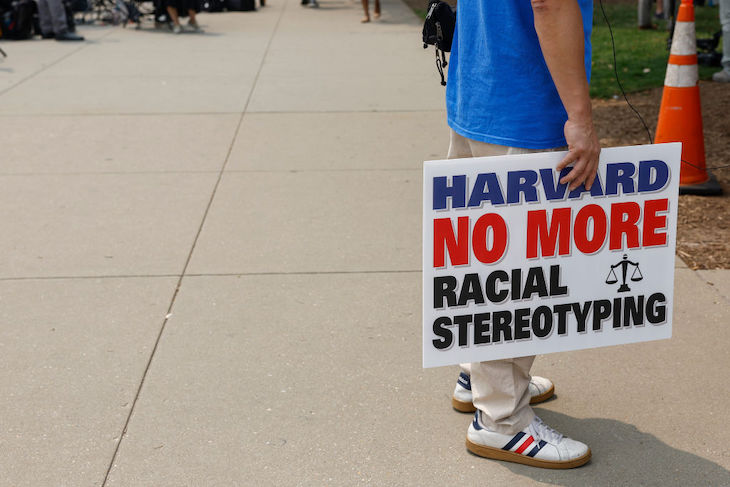I’ve never cared for the expression ‘affirmative action’, which puts a positive spin on a negative practice: naked, institutionalised racial discrimination – that is, real ‘systemic racism’, which was initiated in the United States long before the expression came into fashion. After all, following the Civil War, the 13th, 14th and 15th amendments to the constitution were expressly added to establish equality under to law for Americans of all races, and a raft of Congressional civil rights legislation has since reinforced this colour-blind principle. Perhaps I risk sounding ungrateful. Still, now the Supreme Court has finally ruled that universities in the US are forbidden from admitting students on the basis of race, my knee-jerk response is: what took you so long?
I have a vivid memory of meeting my father at the university in Atlanta where he taught and strolling to our favourite ice cream parlour for a root-beer float. It was 1973, and I was 16. A certain two-wrongs-make-a-right administrative practice would in due course grow deep, tenacious roots in universities across the country, but this was early days for the novel initiative; it wasn’t yet writ in stone that if you were a liberal Democrat you embraced racial preferences in education, no questions asked. Not only was my Virginian father one of those liberal Democrats, but he’d been heavily involved in the civil rights movement, including marching with Martin Luther King, Jr and participating in numerous race-relations forums in North Carolina and Georgia. For a white guy, he’d got the T-shirt. Though our ideological paths would eventually diverge, as a teenager I followed closely in his political footsteps.
Our intellectual elite no longer believes in meritocracy
I remember that afternoon because it was the first time my father and I talked about ‘affirmative action’, a term I had only just learned. I knew that people like us opposed the Vietnam War and recycled our mayonnaise jars. But advocacy for this new notion that universities should lower their admissions standards for minority applicants while rejecting white applicants with better grades and higher test scores who would otherwise have been admitted was not yet mandatory for our kind. So my father and I were both still free to consider the policy on its merits, like people with the actual capacity for independent thought. I volunteered that I intuitively disliked the idea. It sounded like more racism to me, and it seemed fundamentally unfair. Having been a distinguished student, with a PhD from Harvard, my father concurred. Such a rigged system was clearly unjust, he said. It was unlikely to solve the problem of racial disparities in our country and might make racial antagonisms even worse.
It won’t surprise you that my father soon changed his tune. One couldn’t be a card-carrying liberal in the US for the last 50 years and oppose affirmative action, especially in academia. Yet I have clung to that precious memory because it confirms for me that my late father’s moral instincts were sound. As the chief justice put it in Thursday’s majority ruling, ‘Eliminating racial discrimination means eliminating all of it.’

It won’t surprise you, either, that I have not changed my tune. Affirmative action struck me from the off as bureaucrats doing exactly what they were claiming to abolish. My feelings about this issue have grown as entrenched as the policy itself.
If American universities cared about exposing their charges to genuine diversity, they’d fill strict mathematical quotas for Republicans
No other programme has done more to perpetuate racism in the United States. Racial preferences in education have cast implicit doubt on the qualifications of minority professionals. Even black clients and patients have good reason to worry if a lawyer or doctor is black: does this person know what they’re doing? Did he or she only acquire qualifications through a kind of legalised cheating? Though that uneasiness is often unwarranted, a dubiety plagues even minority professionals who are stars in their fields. Racial preferences have internalised that same misgiving in minority students and graduates: would they have got into Harvard without help?
An institutionalised leg-up is implicitly condescending. By implication, blacks, Hispanics, and Native Americans – but interestingly not ‘white adjacent’ Asians – are so educationally hopeless that they can only get into selective schools if we ask them to meet pathetic, bespoke requirements. The difference between the standardised test scores of black and Asian students admitted to Ivy League schools is hundreds of points. Once admitted, too, underqualified students are often not up to speed and can’t do the work, which doesn’t help anyone, least of all the students themselves. Poorly prepared students in demanding Stem subjects, for example, often end up opting instead for softball majors – or dropping out altogether.
Meanwhile, high-achieving Asian applicants, often from families who prioritise educational attainment and push their kids to sacrifice hanging out with friends for burning the midnight oil over textbooks, have been rewarded for their efforts with a slammed door. Harvard has been using insulting personal ratings on ‘positive personality’, ‘likeability’, and ‘courage’ to knock Asian applicants out of the running.
Previous mealy-mouthed rulings from the Supreme Court have disallowed the use of rigid racial quotas while allowing universities to employ race as one of several factors in a holistic analysis of individual applicants. In practice, however, race has been a clearly determinative factor. Despite varying rates of minority applications, the percentage of each race in a given freshman class in the Ivies has remained suspiciously constant. Selective US schools have been using mathematical racial quotas for decades, but desperation to disguise this fact explains why their admissions offices are notoriously secretive.
These shenanigans all genuflect to the God of ‘diversity’. Earlier Scotus rulings have accepted that racially rigged student bodies are a vital component of a rounded education. Supposedly, socialising with students from different backgrounds is edifying. While I don’t have any stats on campus fraternising at my fingertips, it’s unlikely that college students are any different than the rest of the American population, which still self-segregates up a storm. It’s awkward, right? But despite the prettily multicoloured friendship groups we now see on TV, most Americans gravitate socially to their own race. Chances are that college students do the same. Worse, in defiance of the hallowed diversity that justifies rejecting all those Asian applications with perfect SAT scores, some universities are establishing all-black dormitories and clubs, calling them ‘affinity groups’. So much for invigorating interactions with difference. Besides, the preponderance of minority entrants at Harvard are upper-middle-class to wealthy (meaning they conveniently pay full tuition); in a crucial economic sense, the students are largely the same.
With any luck, this is just the beginning of a jurisprudential revolution
If American universities cared about exposing their charges to genuine diversity, they’d fill strict mathematical quotas for Republicans, and applicants would get extra points for admitting on their admissions forms that they don’t believe in the ‘climate emergency’ or that they’re fans of Donald Trump. That would get sparks to fly in the classroom. Instead, administrators encourage a political monoculture, with the overwhelming majority of faculties self-identifying as left-wing.
According to the Pew Research Center, three-quarters of Americans agree with the Supreme Court and do not want race to be considered in university admissions. That includes majorities of all races. Most minority citizens want to be judged on their merits and not by the colours of their skin – hardly a radical preference, and good for them. Yet so embedded is affirmative action in American higher education that many a cynic is certain that universities such as Harvard will continue to employ de facto racial quotas in admissions, even if the practice is now flagrantly against the law. It’s no little perplexing why the progressive educational complex has become so passionately attached to a mathematically inflexible version of virtue that has so many dreadful unintended consequences.
The direst, most long-term damage these warped, prejudicial practices have wrought is a gradual erosion of competence in the United States. Our intellectual elite no longer believes in meritocracy, and whole books are devoted to demolishing the concept. But what do we put in meritocracy’s place? Promotion through group membership, a racialised version of nepotism. Pursued for long enough, these policies encourage unearned entitlement, dishearten the hard working, and degrade a country’s capacity to do big things well.
I return to that gut impression I had back when I was 16. Affirmative action isn’t fair. It isn’t constitutional, and it isn’t American. I was unhappy about this court’s decision on abortion, so I’m greatly relieved to finally get my money’s worth from a conservative bench. With any luck, this is just the beginning of a jurisprudential revolution. Anti-meritocratic racial preferences are now rife in American corporations and in all levels of government. I want to see all racial preferences go. The better half of my much-missed father’s nature would yearn to see the back of them as well.







Comments